Today’s leading short-term rental advocates learned much of their skillset from mistakes they made along the way.
Two of them, COO Alexa Nota and Head of Leadership Development Dana Lubner of Rent Responsibly, recently shared some of their tips and shortcuts for avoiding the long detours of advocacy hard knocks. Here are their top 10 recommendations for advocacy resources geared toward STR alliances and trade associations, along with some insightful tips on how to use them.
This article is the written companion to our Summer 2022 RR Summit session Top 10 Advocacy Resources & How to Take Advantage of Them. Watch the replay of this session here >
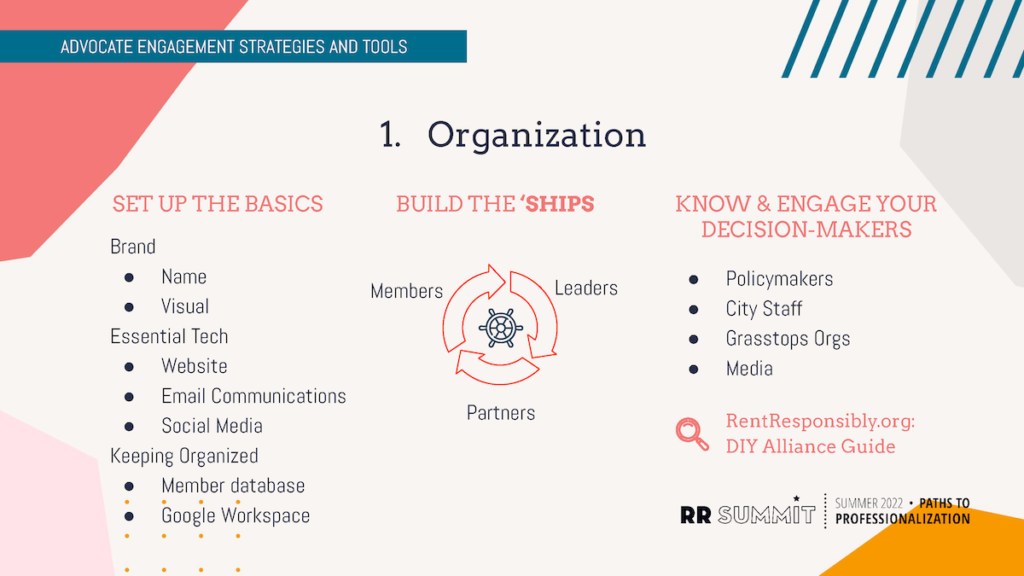
1. Set up your short-term rental organization
Start with the basics. Choose a name for your organization; create a visual brand, website, and social media accounts; set up email accounts; and develop a member database. Google Workspace offers a great suite of tools that will help you stay organized with Docs, slideshows, and spreadsheets.
The next component of setting up your organization for advocacy success is building a community of members, leaders, and partners.
“If you are doing any advocacy, campaigning or starting any group, nobody can do that alone. That is a great recipe for burnout,” Alexa said. “So as you’re getting organized, you want to think about other volunteers, other leaders who can help you carry the workload and add their expertise to the effort.”
Finally, get to know and engage with your decision-makers, policymakers, city staff, grasstops organizations, and members of the media – all of whom have some voice in the outcome for STR policies.
See also: Regulations 101: A primer on how short-term rental rules made
For more information on setting up an organization, see The Ultimate Guide: Building a Self-Sustainable Short-Term Rental Alliance.
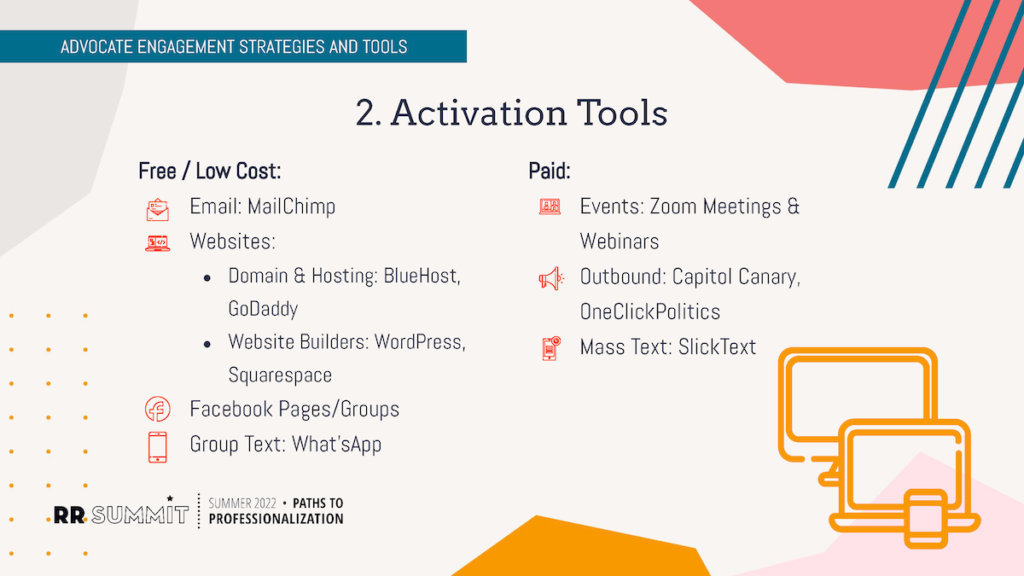
2. Short-term rental advocacy activation tools
Once you’ve founded your organization, equip members with activation tools that will help them in their advocacy efforts. Many of these tools are low cost or free; others come with a cost. Do your research and determine what’s best for your organization.
Some free, low-cost tools include MailChimp for your mass email, an efficient way to outreach to advocates and spur people to action; website domain hosts like BlueHost and GoDaddy; WordPress and Squarespace to build your website, group text messages on WhatsApp, and Facebook pages and groups for your organization.
On the paid side, you can get a Zoom subscription for longer meetings and webinars, leverage Capitol Canary and One Click Politics to promote campaigns and build support for your cause, and SlickText for mass text messaging.
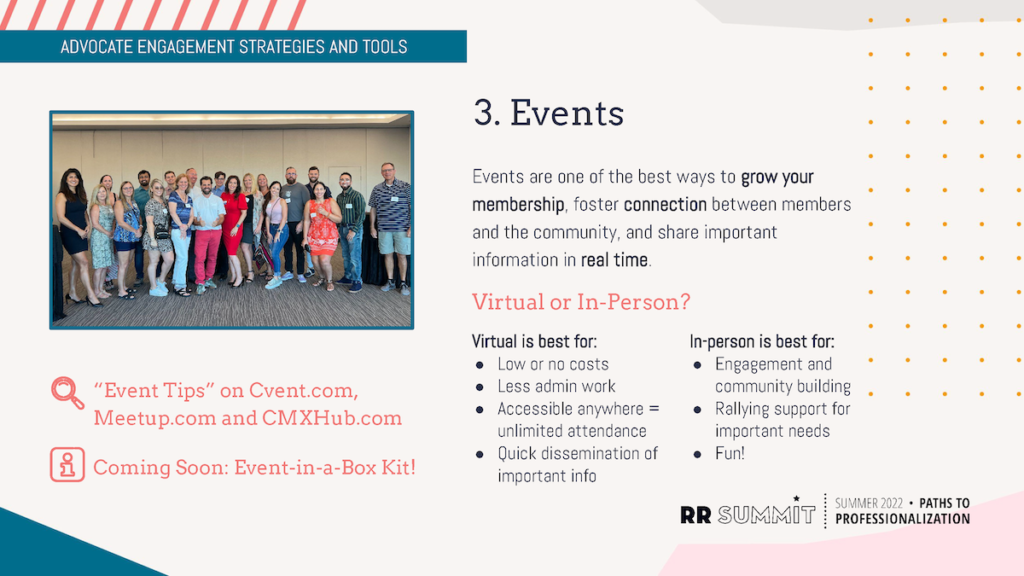
3. Short-term rental advocacy events
Events are one of the best ways to grow your membership, foster connection between your members and the community, build engagement, and share important information in real time.
Virtual events are better for minimizing costs, reducing administrative work, and providing access from anywhere with unlimited attendance and the ability to quickly disseminate information.
On the other hand, in-person events help foster engagement, build community, and rally support for important needs, so choose your format based on your goals for the event.
For more event tips, tools and templates, check out our robust Event Toolkit.
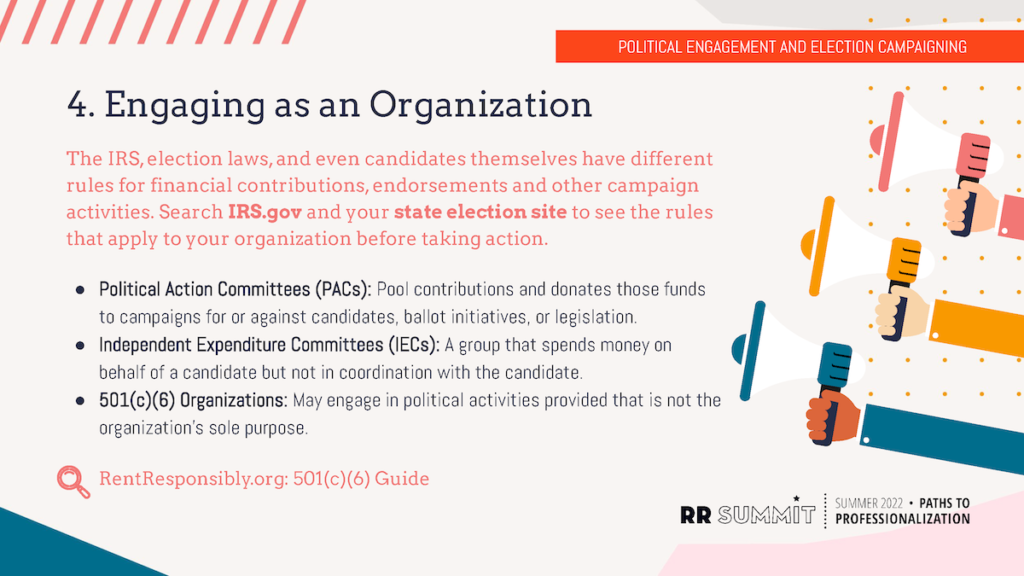
4. Engaging in politics and elections as an organization
Local elections happen almost every year. With STR ordinances in the hands of city councils, it’s imperative for the short-term rental community to be engaged in those elections, Alexa said.
“You can’t just be fighting the current ordinance fire you’re dealing with; you’ve got to be looking ahead and fireproofing against future threats by making sure you get good people into office who understand short-term rentals and are open minded towards fair regulation,” she said.
Political engagement comes with laws and rules to be aware of. The IRS, local election laws, and even candidates themselves have different rules for financial contributions, endorsements, and other campaign activities. Search IRS.gov and your state election site to see the rules that apply to your organization before taking action.
Here are some of the groups that contribute to political campaigns:
- Political action committees (PACs) pool contributions and donate funds to campaigns for or against a candidate, ballot initiative, or legislation.
- Independent expenditure committees (IECs) spend money on behalf of a candidate but not in coordination with the candidate.
- 501(c)(6) organizations may engage in political activity provided it’s not the organization’s sole purpose.
More and more short-term rental alliances are looking to become 501(c)(6) organizations. To learn more about this process, check out The 501(C)(6) Guide: Turning Your Short-Term Rental Alliance into an Incorporated Nonprofit Trade Association.
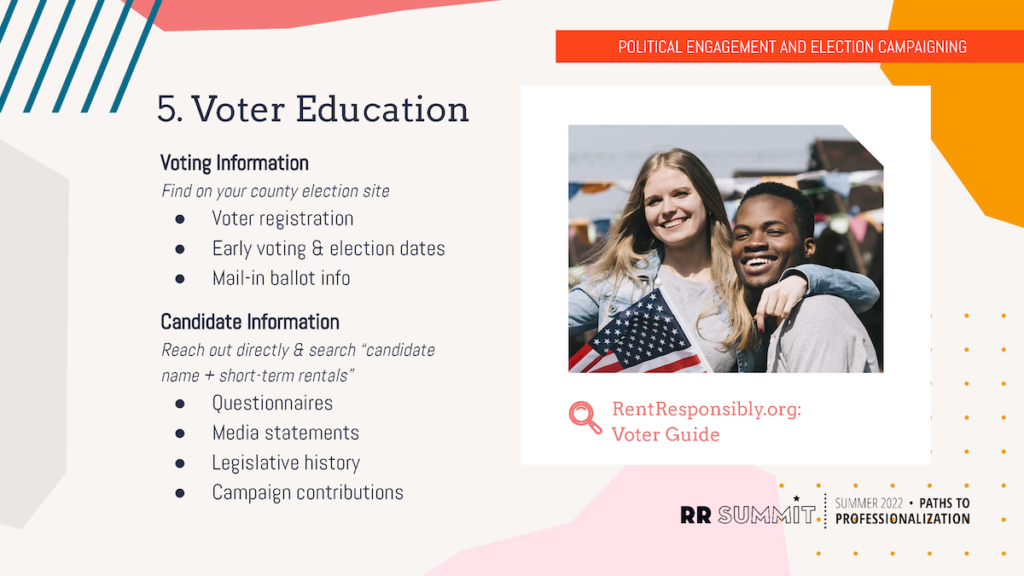
5. Voter education for short-term rental hosts and managers
One of the best ways for organizations to increase their members’ engagement is to provide voter education and voter guides.
“There are two buckets of information that you want to give to your members every opportunity you can,” Alexa said. “One of them is, of course, how to vote.”
Your members will also need to know how to register to vote, the timeline for early voting, the deadline to submit a ballot, and how to mail in a ballot, in states that offer that convenience.
Visit your county election site to find out that information and add it to your organization’s voters guide.
“Sometimes those websites are hard to navigate, so if you can just package that up and give that right to your members, they will love you for it,” Alexa said.
Learn about the candidates running in local elections by reaching out to them directly, sending them questionnaires to learn about their opinions on short-term rentals, or searching online for their statements to the press, past legislative votes, and who contributed to their election or reelection campaigns. Then, showcase their stances on STRs in your voter guide.
For more, see How to compile a voter guide for your short-term rental alliance.
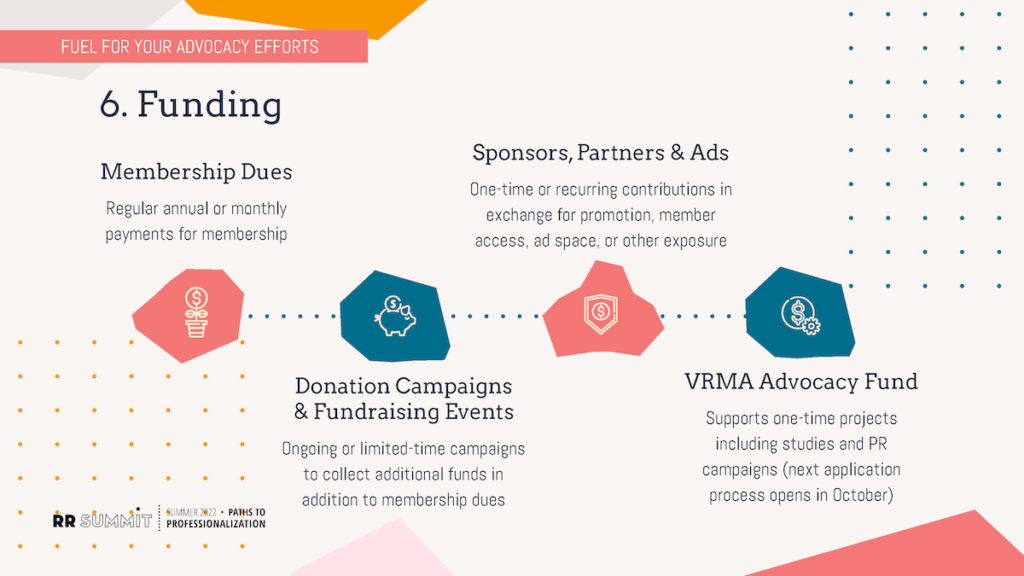
6. Funding for your STR organization
Membership dues can help make your organization self-sustaining. Dues can be charged annually or in monthly payments. Sponsors, partners, and ads are other ways to fund your budget through one-time or recurring contributions in exchange for promotion, member access, ad space, or other exposure.
Donation campaigns and fundraisers can help supplement revenue and fund special projects or events. The campaigns can be ongoing or for a limited period of time.
Organizations also can apply for a grant from the VRMA Advocacy Fund, which supports one-time projects including studies and PR campaigns. The next application process opens in October 2022.
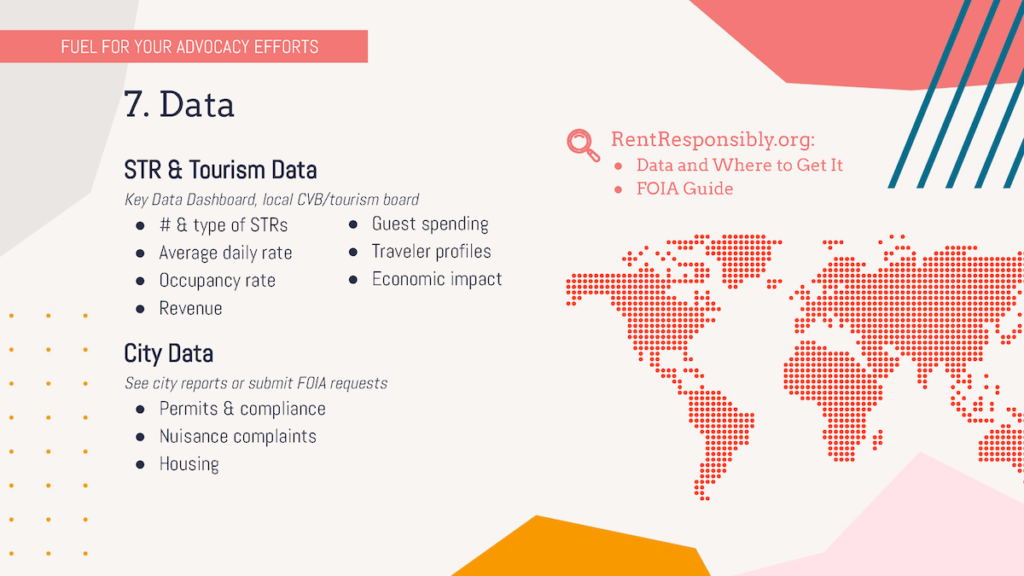
7. STR data
When you’re advocating for your cause, success depends on providing accurate data about what is actually happening in your community.
“In any short-term rental regulatory discussion, our opponents are often using anecdotes or emotional arguments, when the facts just don’t back that up,” Alexa said. “So you have a duty and a responsibility to provide timely and accurate data into the conversation.”
You can find this data from a variety of sources. The Key Data Dashboard and your local CVB or tourism board can provide data such as the number of STRs in your community, average daily rate, occupancy rate, guest spending, traveler profiles, economic impact, and revenue generated by visitors.
Head to your city’s website or City Hall to find city reports on STRs or submit a Freedom of Information Act (FOIA) request.
“Housing is the hot topic of short-term rental regulations at the moment,” Alexa said. “If you can get things like your total housing mix, total available units in your city, find out how many are vacant, find out what percentage of your market is actually made up of short term rentals, chances are it’s pretty tiny, and you can provide the real picture of short-term rentals’ impact on housing and things like that in your community, that’s huge.”
Find out more tips on filing a FOIA request here and see other data you might want and where to find it.
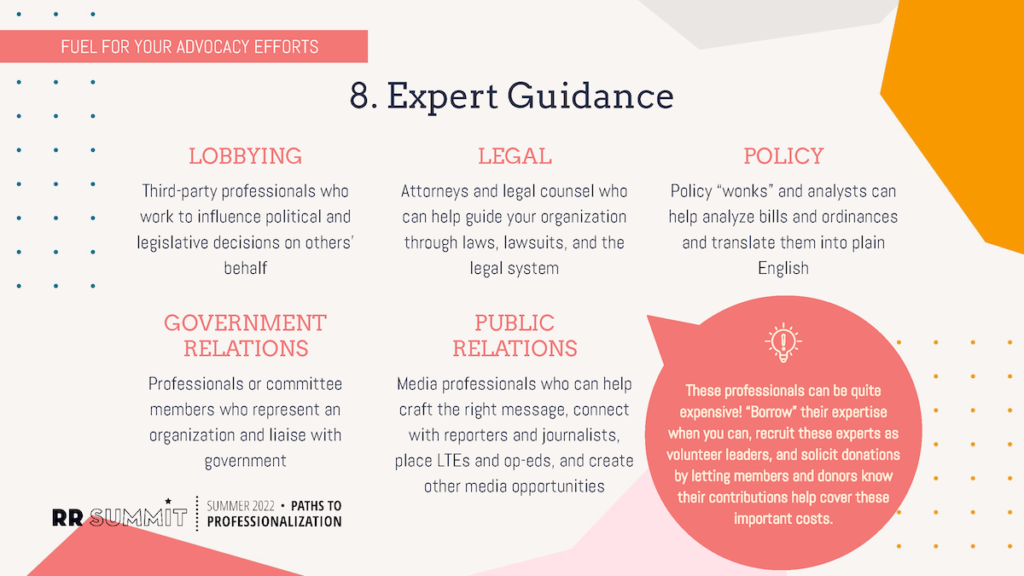
8. Expert guidance on STR policy, lobbying, PR and more
While advocating for fair STR regulations, you might need some help “translating” legalese into something an ordinary person can understand.
“If you’ve ever read an ordinance, it’s mind numbing, if you don’t come from that space, or if you’re not a poli-sci major,” Alexa said. “Having a policy person there to translate that into plain English and tell you what the implications of different provisions are is going to be crazy helpful.”
Here are some of the experts who could be helpful to you: lobbyists, attorneys and legal counsel, policy analysts, governmental relations managers, and PR professionals.
Contracting with these professionals can be expensive. Instead, “borrow” their expertise when you can, recruit these experts as volunteer leaders, and solicit donations by letting members and donors know their contributions help cover the cost of hiring these experts, Alexa said.
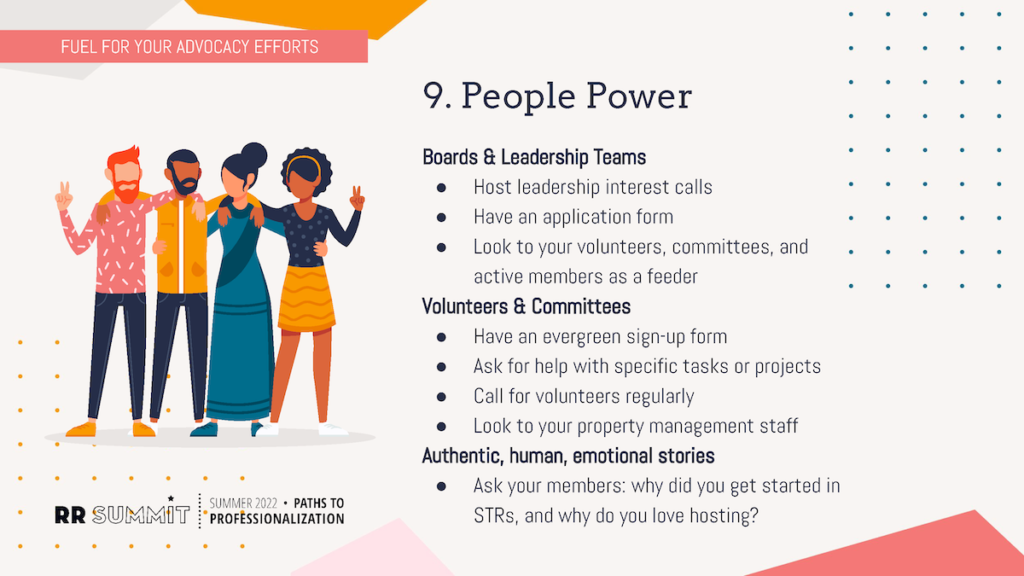
9. Leveraging the people power of STR hosts and property managers
The most important advocacy tool is the people you team up with to advocate for short-term rentals.
“People are the foundation of your organization and give life to your mission,” Dana said.
Create an application for members of your board as well as an evergreen signup sheet for members. In the application, ask candidates about their interests and skill sets to try to create a team that fits well together and meets the organization’s needs.
Consider holding a leadership interest call, where you can invite members of the community to join the board.
Google Forms is a great place to create your member sign-up sheet. You can set up notifications so that you receive an email each time a new volunteer signs up. Make sure that you make a call to action to recruit more members on a regular basis and continue to outreach to members of the STR community that might not have heard about what you’re doing.
“Another ongoing people project is to always collect authentic human and emotional stories,” Dana said. “So ask your members, ‘Why did you get started in short term rentals? Or why do you love hosting?’
“These responses can be used as letters to the editor, features and blurbs in your newsletter or within your community to fuel members and showcase the humanity of what we do.”
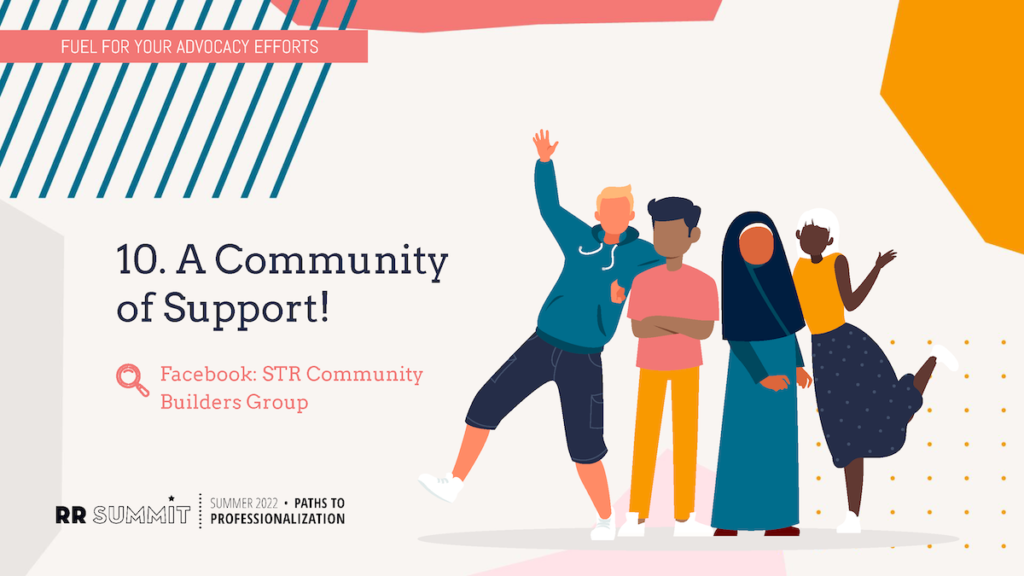
10. Advocacy leader community of support
Being part of a community makes you more effective and creates an atmosphere of support that helps nourish and improve the industry.
In addition to your local community, consider joining a broader community of STR professionals through Facebook groups like Rent Responsibly’s STR Community Builders Group.
“This is a group where community leaders can come together to talk about the challenges they face, to gather ideas and resources from each other, and to help each other solve problems that they’re facing in their individual destination,” Dana said. ”Because while destinations may be different, we see a lot of commonalities and threads across the map, and know better to find answers to the challenges that you’re facing, but from other people that are also going through the same difficult difficulties in their own destination.”
•••
SUBSCRIBE TO GET UPDATES



